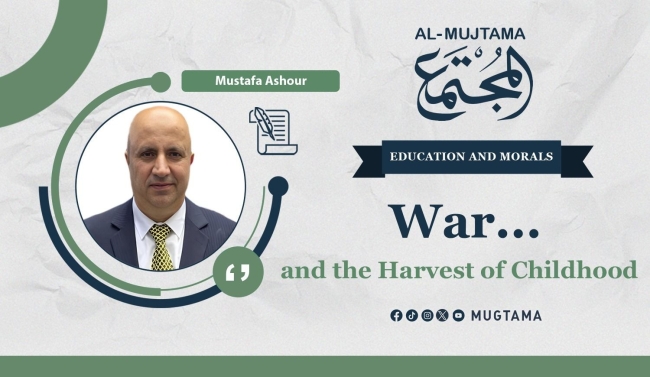War is painful, its scenes are horrific, and its memories linger, but its effects on children are the most dangerous, profound, and enduring, as it imprints on the blank pages of their souls.
In recent years, the world has witnessed approximately 110 armed conflicts in various regions, with children being among the most affected victims. They suffer from the loss of their families, the harsh life of displacement and refuge, death, injuries, exploitation, deprivation of education and safety, as well as mental, emotional, and physical illnesses.
Statistics indicate that nearly 449 million children live in conflict zones, and one in six children worldwide is affected by the negative impacts of wars and conflicts. This means that the world is facing tens of millions of victims in the coming years, forming a future social, security, and health burden on societies. The bitter experiences of these children will not pass without a heavy price.
In the last decade, according to United Nations data, civilians made up 90% of war and conflict casualties, with children forming a significant portion of those victims. Airstrikes and tanks do not distinguish between adults and children, killing indiscriminately, as seen in Gaza, where entire residential areas, tents, and hospitals were bombed. In 2023, there were 26 wars and armed conflicts worldwide, with 22,557 children subjected to 32,990 violations, mainly in the occupied Palestinian territories, Somalia, Burma, Nigeria, and Sudan.
One of the impacts of war on children is malnutrition, lack of food, and food contamination, leading to weakened immunity, the spread of infectious diseases, and general weakness. A 2022 study revealed a connection between Alzheimer's disease and childhood traumas experienced by those under 18, indicating that exposure to war, destruction, and random bombings is among the greatest psychological traumas.
War also affects education by destroying educational infrastructure such as schools, displacing teachers, and forcing children into unstable refugee lives. Many children bear the burdens of life after losing their fathers in war. In 2023, UN Secretary-General António Guterres stated that around 78 million boys and girls worldwide do not attend school due to conflicts, disasters, and displacement—a terrifying figure.
War’s impact on children’s health is devastating to childhood itself. A 2020 study spanning nine years focused on the dangers of war on reproductive health. The study took Gaza’s 2006 events as a model, highlighting the environmental pollution caused by heavy metals from weapons, leading to birth defects, cancer in children, and congenital abnormalities. It confirmed that most heavy metals are carcinogenic and teratogenic, with long-lasting effects on human health, especially for children.
Psychological studies show that wars expose children to what is called "toxic stress." Children who experience continuous and prolonged stress without receiving proper care develop biological responses to that stress that may persist throughout their lives. This toxic stress disrupts the healthy development of the brain and other bodily systems, increasing the risk of diseases in adulthood. Surviving conflicts is only the beginning of new psychological, physical, and mental suffering.
A 2020 study confirmed that children in conflict zones in the Middle East suffer from post-war traumas. It highlighted alarming statistics, including that the war in Syria has displaced 2.5 million Syrian children, while Palestinian children cannot escape the horrors of conflict under Israeli siege. The study stressed that toxic stress can disrupt brain development, increase mental illnesses, and cause cognitive and emotional decline, with effects that may continue even after the war ends. More dangerously, children in conflict zones face suicidal thoughts, nightmares, bed-wetting, stuttering, phobias, and aggressive behaviors. Poverty often persists after the war, bringing with it new, more severe problems.
It is also noted that many children in conflict zones develop indifference. The frequent exposure to bloodshed and destruction dulls their emotional responses, making them lose empathy and focus solely on survival. This creates an intense individualism and isolation that weakens societal bonds and social cohesion.
The book Childhood in War: Voices from Sarajevo by Bosnian author Jasminko Halilović, published in 2024, successfully compiled quotes from 1,100 individuals who experienced war during their childhood in Bosnia and Herzegovina. The siege of Sarajevo lasted 1,425 days—the longest siege in modern history—during which schools, hospitals, libraries, museums, and religious buildings were destroyed. In 2017, Halilović also founded the War Childhood Museum, the only museum in the world dedicated to the experience of war-affected childhoods. The book and the museum convey a poignant message: war takes children into a world they should never live in, replacing their playful, innocent world with cruelty and death, leaving them unable to understand the reason behind this painful transformation.
-------------------------------------------------------------


